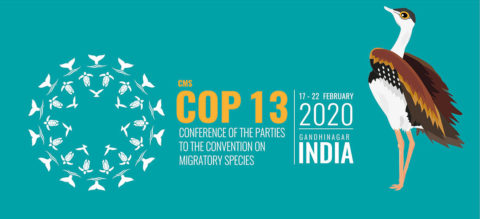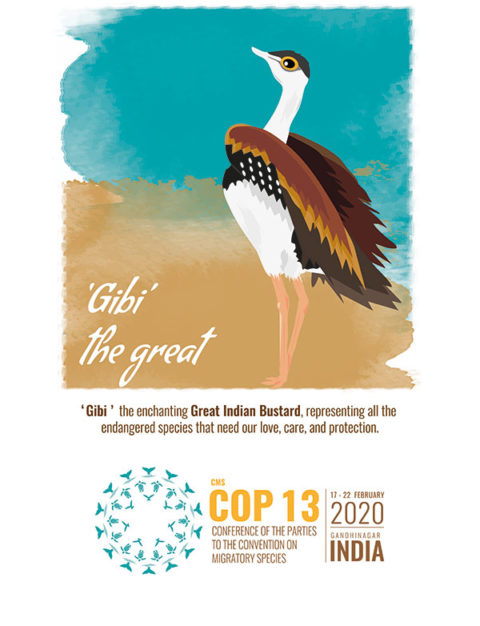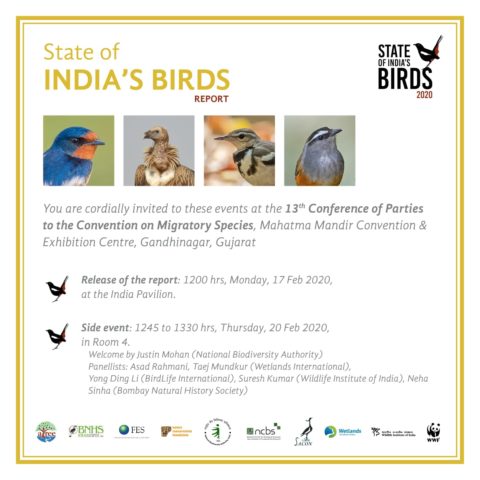Join us at the Convention on Migratory Species COP13
The Convention on Migratory Species’ Conference of the Parties this month kicks off a ‘super year’ for biodiversity as the world looks to form a new global accord to stem the loss of wildlife and habitat, including wetlands.

The thirteenth Convention on Migratory Species Conference of the Parties will discuss priorities including the impact of infrastructures such as roads, pipelines and power lines on habitat, and ecological connectivity, the unimpeded movement of species and the flow of natural processes that sustain life on Earth. Discussions will feed into a global agreement expected later this year. We will be at CMS COP13 in Gandhinagar, India from the 17-22 February. We warmly invite you to join our side-events in which we participate or jointly organise.
Stakeholder Dialogue
The Stakeholder Dialogue will feature a special dialogue between the civil society representatives, dignitaries from around the world, executives of International and National Organizations and other leaders. Our Head of Business and Ecosystems, Ward Hagemeijer, will be speaking at this event.
Saturday 15 February, 14.30-16.30, Seminar Hall 1
Bridging Information of Wetlands and Waterbirds
Sustainably managing wetlands is crucial if declining populations of migratory waterbirds is to be halted and reversed.
The session will bring policy and decision-makers from South Asia region to discuss regional
collaboration opportunities and mechanisms for conserving migratory waterbirds and
wetlands in South Asia. A tool for systematic wetlands inventory, assessment and monitoring
of wetlands to provide a basis for integrated management planning will also be launched. Wetlands International South Asia (WISA) and Deutsche Gesellschaft für Internationale Zusammenarbeit (GIZ) will be convening this session.
Monday 17 February, 13.45- 14.30, Room: 1
Implementing the Central Asian Flyway National Action Plan
This event is to launch the BNHS project funded by the Ministry of Environment Forest and Climate Change. It will be hosted by Bombay Natural History Society.
Monday 17 February, 1345 – 1545, Venue: India Pavilion, CMSCOP13
Safeguarding Connectivity: from Bird Data to Management Tools
Stakeholders such as government, business and conservationists all need information and
tools to manage and conserve waterbirds and their habitats across all major flyways. Such information includes bird numbers, estimates of waterbird population sizes and trends (critical for designation of sites and development of action plans). They also require information to help identify and prioritise conservation or restoration sites based on climate-related water and species distribution models.
This session will discuss models such as the “Critical Site Network Tool” and monitoring systems such as the International Waterbird Census and Important Bird Area. The various steps from data to application will be showcased with the launch of the latest Asian Waterbird Census India report, presentation of a ‘Visual Prototype’ of a new Waterbird Population portal and the presentation of the plans for a global connectivity tool.
Organisers: Wetlands International
Tuesday 18 February, 12:45 – 13.30, Room: 3
Climate Change Adaptation – How Can Migratory Species Survive?
Climate change is causing significant change to the ecology of migratory species around the
world. This workshop will consider how migratory species might adapt to these changes and
what measures could be put in place to help their survival.

The workshop will include a series of short presentations focusing on the issues in marine,
coastal and terrestrial ecosystems. It will highlight particular case studies where action is required to assist species conservation. It will also highlight cases where action is being taken and will consider how to learn from “best practice “to inform future projects. The presentations will be followed by a short facilitated discussion with the participants to identify priorities for future action.
It is intended that the session will help inform the work of the CMS Climate Change Group, with this Group convening a meeting later in 2020 to take forward its work programme.
Organiser: Convention on Migratory Species(CMS)
Tuesday 18 February, 18.15- 19.00, Room: 2
Coastal mudflats as a key wintering habitat for migratory birds: conservation issues and challenges
Mudflats are characteristics of coastal intertidal regions and are found across the globe where
the mud is deposited in sheltered bays, lagoons, creeks and estuaries. Mudflats are highly
productive ecosystems that harbor a variety of invertebrates that attract a variety of vertebrates
including the migratory birds. Globally mudflats are threatened due to a range of
anthropogenic activities including the change in land patterns.
The Ramsar COP during 2018 has resolved to maintain and conserve the mudflat ecosystems as important habitat for different coastal life forms. Understanding the importance to migratory birds, it is essential to resolve conservation of mudflats through multisectoral dialogues and policies.
Organisers: Sálim Ali Centre for Ornithology and Natural History (SACON) under the MoEF&CC
Thursday 20 February, 13.45- 14.30, Room: 5
State of India’s birds
Our Senior Technical Officer Taej Mundkur will be speaking at this event.
Thursday 20 February, 12.45- 13.30, Room: 4

Further information about the Conference including documents and logistical information can be found here.
